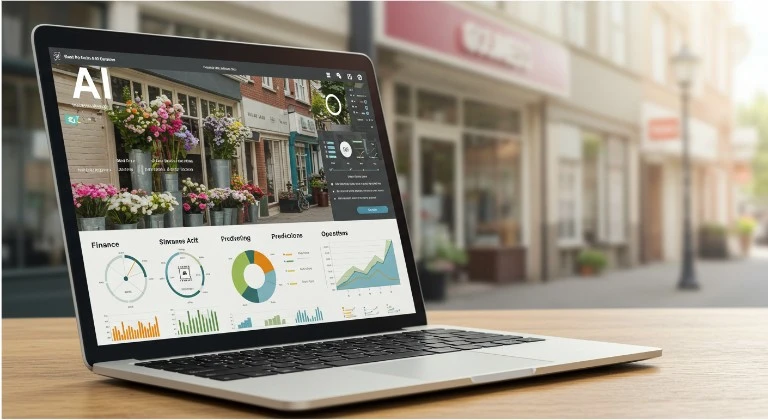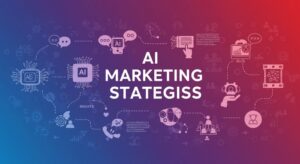Artificial Intelligence (AI) is no longer just a buzzword reserved for tech giants or futuristic novels. Today, AI is revolutionizing small business operations, helping owners streamline processes, cut costs, and compete with larger competitors. If you’re running a small business, you’re likely wondering, “How can AI help me?” Let’s dive into how AI is reshaping the business landscape and how you can leverage its power to achieve growth and efficiency.
Table of Contents
The Efficiency Boost: How AI Improves Small Business Operations

1. Automation of Repetitive Tasks
AI tools can take over time-consuming tasks like data entry, inventory management, and even email responses. Tools like QuickBooks Online simplify accounting by automating invoicing, payroll, and expense tracking. Not only does this save time, but it also reduces the risk of human error. This means you can focus on what truly matters: growing your business.
Insert table comparing manual vs. AI-powered task completion times.
2. Streamlining Inventory Management
Managing inventory can be a headache, but AI tools like PaveAI provide predictive analytics to ensure you’re stocked with the right products at the right time. This means fewer stockouts and less overstocking, translating to better cash flow management and happier customers.
3. Enhancing Employee Productivity
Imagine your employees focusing on creative, high-value tasks while AI handles routine work. Tools like Notion AI integrate content generation with workflow automation, freeing up time for innovation. This not only boosts morale but also increases overall team efficiency, allowing your business to achieve more in less time.
4. Better Time Management
AI-powered scheduling tools like Fathom ensure your meetings are more productive by transcribing and summarizing key points. This reduces time spent on administrative follow-ups and helps you and your team stay on track.
Cutting Costs with AI
One of the most appealing benefits of AI for small businesses is cost reduction. AI-powered platforms like Hootsuite and Zoho CRM automate marketing and customer management, helping you save on staffing costs without sacrificing quality. Additionally, AI chatbots like Tidio can handle customer queries 24/7, eliminating the need for round-the-clock customer service staff.
Real-World Example:
A boutique clothing store used Tidio to manage online customer inquiries. The chatbot resolved 80% of questions without human intervention, allowing the owner to cut customer support costs by 30%. Similarly, small cafes have used QuickBooks Online to handle payroll tasks, saving thousands annually on accounting fees.
AI and Customer Service: A Perfect Match
Personalized Customer Experiences
AI tools like Amazon Personalize analyze customer behavior to deliver tailored product recommendations. This personalization builds stronger relationships and increases sales. Imagine walking into a store where the staff knows exactly what you need—that’s the online equivalent of what AI can offer.
24/7 Availability
Chatbots such as ChatGPT by OpenAI ensure your customers always have someone to “talk” to, even at 3 AM. By automating responses, you’re meeting customer needs instantly and improving satisfaction rates. Plus, these bots can escalate complex issues to human staff, ensuring your team focuses only on high-value interactions.
Supercharging Marketing Strategies with AI
Smarter Campaigns
AI-driven marketing platforms like Mailchimp and HubSpot CRM use customer data to craft highly targeted campaigns. This precision leads to higher engagement and conversion rates. From personalized email offers to predictive audience segmentation, AI enables smarter, more efficient marketing.
Generative AI for Content Creation
Tools like Canva and Notion AI can generate eye-catching visuals and compelling copy in minutes. This is a game-changer for small businesses without a dedicated design or marketing team. Picture creating a week’s worth of social media posts in just an hour—AI makes it possible.
Data Analysis and Decision-Making
AI excels at analyzing vast amounts of data quickly and accurately. Tools like Gemini by Google Cloud provide actionable insights, enabling data-driven decision-making. Whether you’re forecasting sales or identifying market trends, AI ensures you’re always a step ahead. This empowers small businesses to make informed decisions that were once only accessible to larger corporations.
Predictive Analytics
AI-powered predictive analytics tools help you anticipate customer needs, market trends, and inventory demands. For instance, Salesforce Einstein offers insights that can help you tailor your sales strategies, ensuring maximum ROI.
FAQs: Common Questions About AI in Small Business
1. How can AI help small businesses improve efficiency?
AI streamlines operations by automating repetitive tasks, analyzing data, and providing actionable insights. It allows you to focus on strategic growth rather than day-to-day operations.
2. What are the best AI tools for small business operations?
Popular tools include QuickBooks Online for accounting, Tidio for customer service, and HubSpot CRM for marketing automation. Each of these tools caters to specific needs, making them versatile and effective.
3. Can AI reduce operational costs for small businesses?
Absolutely. By automating processes, AI cuts labor costs and minimizes errors, ultimately saving money. For instance, tools like Zoho CRM replace the need for large sales teams while maintaining or even improving efficiency.
4. How does AI enhance customer service for small businesses?
AI-powered chatbots and analytics tools provide instant, personalized responses and 24/7 support, improving customer satisfaction. Advanced platforms like IBM Watson Assistant can even handle complex queries with ease.
5. What are the risks of using AI in small business operations?
While AI offers numerous benefits, potential risks include high initial setup costs, the need for ongoing maintenance and training, and potential data security concerns. Partnering with reputable providers mitigates many of these risks.
6. Is AI affordable for small businesses with limited budgets?
Yes! Many AI tools offer scalable pricing plans, making them accessible even to startups. Tools like Canva and Mailchimp provide affordable options for creative and marketing needs.
7. How can small businesses use AI for marketing and sales?
AI enables hyper-targeted marketing campaigns, sales forecasting, and customer journey mapping. For example, PaveAI converts Google Analytics data into actionable insights.
8. What steps should a small business take to implement AI tools effectively?
Start by identifying pain points, then research affordable tools tailored to your needs. Pilot programs and staff training ensure a smooth transition.
Conclusion: Embrace AI to Stay Competitive
AI is no longer a luxury for small businesses—it’s a necessity. From boosting efficiency and reducing costs to enhancing customer experiences, the benefits are undeniable. Start small: implement a chatbot, try an AI-powered CRM, or explore marketing automation tools. Over time, these tools will integrate seamlessly into your operations, driving sustainable growth.




